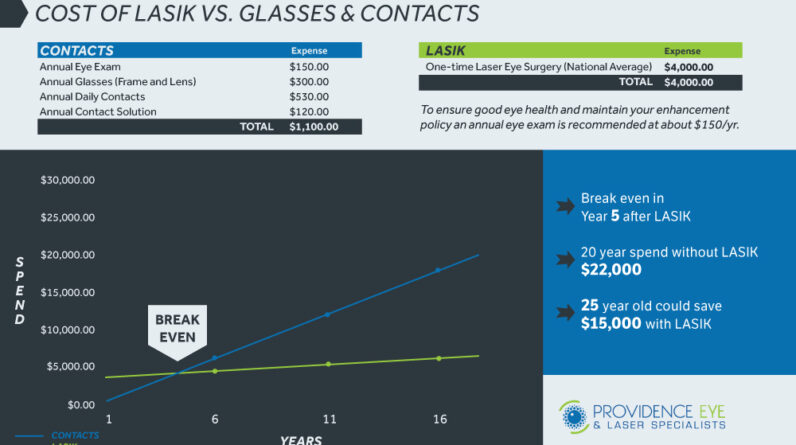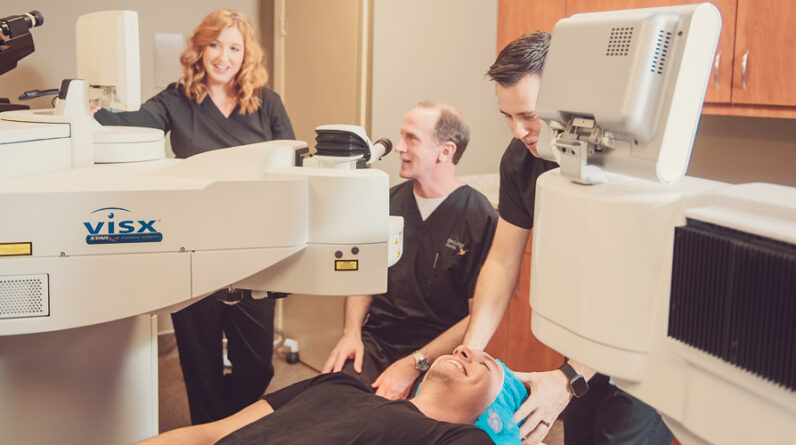LASIK surgery has become an increasingly popular option for individuals seeking clearer vision without the need for glasses or contact lenses. However, when considering this procedure, many wonder if there is an age limitation. In this article, we will explore whether there is an age limit for LASIK surgery and shed light on the factors that determine candidacy for this life-changing procedure. So, if you’ve been contemplating LASIK, keep reading to find out if age is a limiting factor.

Factors to Consider
LASIK surgery is a popular vision correction procedure that can significantly improve your quality of life by reducing or eliminating the need for glasses or contact lenses. However, before considering LASIK, it is important to take into account several factors that can impact the suitability and safety of the procedure for different age groups.
General Health
Your overall health plays a crucial role in determining whether LASIK surgery is a viable option for you. A pre-existing health condition may affect your body’s ability to heal after the procedure or increase the risk of complications. It is important to discuss any underlying health issues with your ophthalmologist to determine if LASIK is a suitable choice for you.
Prescription Stability
The stability of your prescription is another important factor to consider. LASIK is most effective when performed on individuals whose eyeglass or contact lens prescription has remained stable for at least a year. If your prescription is still changing, it is recommended to wait until it stabilizes before considering LASIK surgery.
Eye Health Conditions
Certain eye health conditions may make you ineligible for LASIK surgery. Conditions such as glaucoma, cataracts, corneal diseases, and retinal disorders can affect the outcome of the procedure and increase the risk of complications. Consulting with your ophthalmologist will help determine if LASIK is a suitable option for you based on your eye health.
Eye Anatomy
The anatomy of your eyes can also impact your eligibility for LASIK surgery. Factors such as corneal thickness, corneal curvature, and pupil size play a crucial role in determining the success and safety of the procedure. Your ophthalmologist will evaluate your eye anatomy to ensure LASIK is a suitable option for you.
Age Limit Guidelines
While there is no strict age limit for LASIK surgery, age is an important consideration as it can influence certain factors that impact the outcome of the procedure. Different age groups have specific considerations and guidelines to be aware of.
FDA Recommendations
The U.S. Food and Drug Administration (FDA), which regulates the safety and effectiveness of medical devices, including LASIK, has not set a specific age limit for the procedure. Instead, they recommend that individuals considering LASIK be at least 18 years old, as the eyes may still be developing before this age.
Pediatric Patients
LASIK surgery is typically not performed on children or young adolescents. The eyes of pediatric patients are still developing, and their prescription tends to be unstable. The minimum age for LASIK surgery is generally around 18 years old, but each case is unique and should be evaluated by an experienced ophthalmologist.
Adult Patients
For adults, LASIK surgery can be a life-changing option for vision correction. Adults often have stable prescriptions and may benefit greatly from the procedure.
Presbyopia
Presbyopia, the age-related loss of near vision, is a common concern for adults considering LASIK. While LASIK can correct nearsightedness, farsightedness, and astigmatism, it may not fully address presbyopia. Some individuals may still require reading glasses or additional procedures to address presbyopia after LASIK surgery. Discussing your specific vision needs and expectations with your ophthalmologist is essential.
Concerns and Considerations
Adults considering LASIK should also be aware of other potential concerns and considerations. Factors such as dry eye syndrome, ocular surface diseases, or a history of corneal diseases may affect the suitability and safety of LASIK. An extensive screening and evaluation process will help determine if LASIK is a suitable option for you.
Screening and Evaluation
Before undergoing LASIK surgery, adult patients will undergo a comprehensive screening and evaluation process. This includes a thorough review of medical history, an eye examination, corneal measurements, and a discussion of goals and expectations. Your ophthalmologist will provide personalized guidance based on your individual circumstances.

Older Adults
As we age, our eyes undergo natural changes that can impact our vision and overall eye health. While LASIK surgery can still be a viable option for older adults, there are specific considerations to keep in mind.
Age-related vision changes, such as presbyopia and cataracts, can influence the suitability and outcome of LASIK surgery. Presbyopia, which typically occurs around the age of 40, may require additional procedures or the use of reading glasses after LASIK surgery. Cataracts, which commonly develop in older adults, may also need to be addressed separately.
Cataracts and LASIK
If you have cataracts, LASIK surgery may not be the appropriate procedure for you. Cataracts cause clouding of the natural lens in the eye, and LASIK only corrects the shape of the cornea. In such cases, cataract surgery with intraocular lens implants would be the preferred option to restore vision and address any refractive errors.
Other Vision Correction Options
Older adults who are not suitable candidates for LASIK surgery still have alternative options for vision correction. These include procedures such as refractive lens exchange, where the eye’s natural lens is replaced with an artificial lens, and monovision, where one eye is corrected for distance vision and the other for near vision.
Apart from the specific age groups mentioned above, other age-related factors can influence the success and safety of LASIK surgery.
Healing Capacity
As we age, our body’s healing capacity may decrease. This can impact the recovery process after LASIK surgery. Older adults may experience slower healing times and may require additional post-operative care. Discussing your expectations and potential risks with your ophthalmologist will ensure you have a realistic understanding of the healing process.
Post-surgery Vision Stability
LASIK surgery aims to correct refractive errors and provide long-term vision improvement. However, it is essential to understand that the natural aging process can still affect your vision in the years following LASIK surgery. While LASIK can provide excellent results, individual variations and age-related changes may still impact your vision over time.

Individual Variations
Every individual’s eyes and vision requirements are unique. Therefore, it is crucial to consult with an experienced ophthalmologist to receive a personalized assessment before making a decision about LASIK surgery.
Consultation with Ophthalmologist
A consultation with an ophthalmologist will involve a comprehensive evaluation of your eye health, medical history, and vision needs. They will assess your eligibility for LASIK and discuss the potential risks and benefits based on your individual circumstances. This personalized approach ensures that the decision to proceed with LASIK is well-informed and tailored to your specific needs.
Personalized Assessment
During the personalized assessment, your ophthalmologist will evaluate factors such as your eye anatomy, prescription stability, and overall eye health conditions. This comprehensive evaluation will help determine if LASIK surgery is the most suitable vision correction option for you, or if alternative procedures may be more appropriate.
Alternatives to LASIK
While LASIK surgery is a popular and effective option for vision correction, it may not be suitable for everyone. Fortunately, there are alternative procedures that can address refractive errors and provide vision improvement.
PRK (Photorefractive Keratectomy)
PRK is a laser eye surgery procedure that is similar to LASIK but does not involve creating a corneal flap. Instead, the top layer of the cornea is gently removed and reshaped using laser technology. PRK is an excellent alternative to LASIK for individuals who have thin corneas or other factors that make them ineligible for LASIK surgery.
Implantable Lenses
Implantable lenses, also known as phakic intraocular lenses, are an alternative option for individuals with higher degrees of nearsightedness or farsightedness. These lenses are surgically implanted in front of the natural lens of the eye to correct the refractive error. Implantable lenses can provide excellent vision correction without altering the cornea’s shape, making them a suitable choice for those who are not eligible for LASIK.
Refractive Lens Exchange
Refractive lens exchange is a procedure similar to cataract surgery, where the eye’s natural lens is replaced with an artificial lens. It is a viable option for individuals with significant refractive errors who may not be eligible for LASIK or other laser vision correction procedures. Refractive lens exchange can provide clearer vision and, in some cases, reduce or eliminate the need for glasses or contact lenses.
Monovision
Monovision is a technique that utilizes LASIK or other laser vision correction procedures to correct one eye for distance vision and the other eye for near vision. It is an alternative for individuals who desire reduced dependence on reading glasses. Monovision may not be suitable for everyone, and a trial period with contact lenses may be necessary before deciding on surgical correction.

Conclusion
In conclusion, LASIK surgery can be an excellent option for vision correction at various stages of life, from young adults to older individuals. However, it is crucial to consider factors such as general health, prescription stability, eye health conditions, and eye anatomy before making a decision. Age-related factors, individual variations, and alternative procedures should also be taken into account. Consulting with an experienced ophthalmologist and receiving a personalized assessment will ensure that you make an informed decision about LASIK surgery or explore suitable alternatives for your specific vision needs. Remember, your ophthalmologist is your best resource for determining if LASIK surgery is right for you, so don’t hesitate to schedule a consultation to discuss your options.






